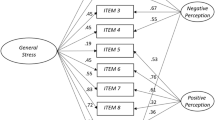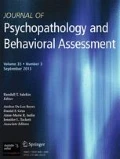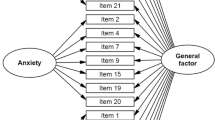Abstract
The present study sought to examine the factor structure and psychometric properties of the Perceived Stress Scale (PSS) when administered to psychiatric patients. We also examined predictive validity of the PSS by assessing the association between the Perceived Stress Scale and the Beck Depression Inventory. A heterogeneous sample of 96 psychiatric patients (48 men, 48 women) completed the Perceived Stress Scale (PSS) and the Beck Depression Inventory. Factor analysis of the PSS established that the scale consisted of two factors. The first factor was comprised primarily of items reflecting adaptational symptoms. In contrast, the second factor consisted of items reflecting coping ability. Both factors had an adequate degree of internal consistency. Finally, a series of regression analyses predicting depression found that both factors accounted for unique variance in depression scores in women, but only the first factor accounted for unique variance in men. It is concluded that the PSS is a multidimensional and internally consistent measure of perceived stress.
Similar content being viewed by others

References
American Psychiatric Association, (1987).Diagnostic and statistical manual of mental disorders (3rd edition-revised). Washington, DC: Author.
Beck, A. T., Rush, A. J., Shaw, B. F., & Emery, G. (1979).Cognitive therapy of depression: A treatment manual. New York: Guilford.
Beck, A. T., Steer, R. A., & Garbin, M. G. (1988). Psychometric properties of the Beck Depression Inventory: Twenty-five years of evaluation.Clinical Psychology Review, 8, 77–100.
Billings, A. G., & Moos, R. H. (1984). Coping, stress, and social resources among adults with unipolar depression.Journal of Personality and Social Psychology, 4, 877–891.
Billings, A. G., Cronkite, R. C., & Moos, R. H. (1983). Social-environment factors in unipolar depression: Comparison of depressed patients and nondepressed controls.Journal of Abnormal Psychology, 92, 119–134.
Blankstein, K. R., & Flett, G. L. (1992). Specificity in the assessment of daily hassles: Hassles, locus of control, and adjustment in college students.Canadian Journal of Behavioral Science, 24, 382–398.
Blankstein, K. R., Flett, G. L., & Koledin, S. (1991). The Brief College Student Hassles Scale: Development, validation, and relation with pessimism.Journal of College Student Development, 32, 258–264.
Cattell, R. B. (1966). The scree test for the number of factors.Multivariate Behavioral Research, 1, 140–161.
Cattell, R. B., & Jaspars, J. (1967). A general plasmode (No. 30-10-5-2) for factor analytic exercises and research.Multivariate Behavioral Research Monographs, 67, 1–212.
Cohen, S. (1986). Contrasting the Hassles Scale and the Perceived Stress Scale: Who is really measuring appraised stress?American Psychologist, 41, 716–718.
Cohen, S., & Edwards, J. R. (1989). Personality characteristics as moderators of the relationship between stress and disorder. In R. W. J. Neufeld (Ed.),Advances in the investigation of psychological stress (pp. 235–283). New York: Wiley.
Cohen, S., Kamarck, T., & Mermelstein, R. (1983). A global measure of perceived stress.Journal of Health and Social Behavior, 24, 385–396.
Cohen, S., Sherrod, D. R., & Clark, M. S. (1986). Social skills and the stress-protective role of social support.Journal of Personality and Social Psychology, 50, 963–973.
Comrey, A. L., (1988). Factor-analytic methods of scale development in personality and clinical psychology.Journal of Consulting and Clinical Psychology, 56, 754–761.
Cooper, C. L. (1988). Personality, life stress and cancerous disease. In S. Fisher & J. Reason (Eds.),Handbook of life stress, cognition, and health (pp. 369–381). New York: Wiley.
DeFrank, R. S., Ivancevich, J. M., & Schweiger, D. M. (1988). Job stress and mental well-being: Similarities and differences among American, Japanese, and Indian managers.Behavioral Medicine, 14, 160–170.
Delongis, A., Folkman, S., & Lazarus, R. S. (1988). The impact of daily stress on health and mood: Psychological and social resources as mediators.Journal of Personality and Social Psychology, 54, 486–495.
Endler, N. S., & Parker, J. (1990). Multidimensional assessment of coping: A critical evaluation.Journal of Personality and Social Psychology, 58, 844–854.
Genest, M. (1989). The relevance of stress to rheumatoid arthritis. In R. W. J. Neufeld (Ed.),Advances in the investigation of psychological stress (pp. 343–366). New York: Wiley.
Gotlib, I. H. (1984). Depression and general psychopathology in university students.Journal of Abnormal Psychology, 93, 19–30.
Gotlib, I. H., & Whiffen, V. E. (1989). Stress and coping in maritally distressed and nondistressed couples.Canadian Journal of Behavioral Science, 21, 401–418.
Gotlib, I. H., Whiffen, V. E., Wallace, P. M., & Mount, J. H. (1991). Prospective investigation of postpartum depression: Factors involved in onset and recovery.Journal of Abnormal Psychology, 100, 122–132.
Hammen, C., Davila, J., Brown, G., Ellicott, A., & Gitlin, M. (1992). Psychiatric history and stress: Predictors of severity of unipolar depression.Journal of Abnormal Psychology, 101, 45–52.
Hewitt, P. L. & Flett, G. L. (1991). Perfectionism in the self and social contexts: Conceptualization, assessment, and association with psychopathology.Journal of Personality and Social Psychology, 60, 456–470.
Hewitt, P. L., & Flett, G. L. (in press). Dimensions of perfectionism, daily stress, and depression: A test of the specific vulnerability hypothesis.Journal of Abnormal Psychology.
Hewitt. P. L., Flett, G. L., & Endler, N. S. (1992).Perfectionism, coping, and depression symptoms in a clinical sample (submitted for publication).
Hills, H., & Norvell, N. (1991). An examination of hardiness and neuroticism as potential mediators of stress outcomes.Behavioral Medicine, 17, 31–38.
Hovanitz, C. A., & Kozora, E. (1989). Life stress and clinically elevated MMPI scales: Gender differences in the moderating influence of coping.Journal of Clinical Psychology, 45, 766–777.
Kanner, A. D., Coyne, J. C., Schaefer, C., & Lazarus, R. S. (1981). Comparison of two modes of stress measurement: Daily hassles and uplifts versus major life events.Journal of Behavioral Medicine, 7, 375–389.
Kline, P. (1987). Factor analysis and personality theory.European Journal of Personality, 1, 21–26.
Kohn, P. M., Lafreniere, K., & Gurevich, M. (1990). The Inventory of College Students' Recent Life Experiences: A decontaminated hassles scale for a special population.Journal of Behavioral Medicine, 13, 619–630.
Kohn, P. M., Lafreniere, K., & Gurevich, M. (1991). Hassles, health, and personality.Journal of Personality and Social Psychology, 61, 478–482.
Kuiper, N. A., Olinger, L. J., & Lyons, L. M. (1986). Global perceived stress level as a moderator of the relationship between negative life events and depression.Journal of Human Stress, 12, 149–153.
Lazarus, R. S. (1984). Puzzles in the study of daily hassles.Journal of Behavioral Medicine, 7, 375–389.
Lazarus, R. S., DeLongis, A., Folkman, S., & Gruen, R. (1985). Stress and adaptational outcomes: The problem of confounded measures.American Psychologist, 40, 770–779.
Newmann, J. P. (1986). Gender, life strains, and depression.Journal of Health and Social Behavior, 27, 161–178.
O'Leary, A., Shoor, S., Lorig, K., & Holman, H. R. (1988). A cognitive-behavioral treatment for rheumatoid arthritis.Health Psychology, 7, 527–544.
Paykel, E. S., & Dowlatshahi, D. (1988). Life events and mental disorder. In S. Fisher & J. Reason (Eds.),Handbook of life stress, cognition, and health (pp. 241–263). New York: Wiley.
Sarason, I. G., Johnson, J. H., & Siegel, J. M. (1978). Assessing the impact of life changes: Development of the Life Experiences Survey.Journal of Consulting and Clinical Psychology, 46, 932–946.
Watson, D., & Clark, L. A. (1984). Negative affectivity: The disposition to experience aversive emotional states.Psychological Bulletin, 96, 465–490.
Author information
Authors and Affiliations
Additional information
This research was supported by Grant 410-91-1690 from the social sciences and Humanities Research Council of Canada as well as by grants from the Research and Program Evaluation Committee Brockville Psychiatric Hospital.
Rights and permissions
About this article
Cite this article
Hewitt, P.L., Flett, G.L. & Mosher, S.W. The Perceived Stress Scale: Factor structure and relation to depression symptoms in a psychiatric sample. J Psychopathol Behav Assess 14, 247–257 (1992). https://doi.org/10.1007/BF00962631
Accepted:
Issue Date:
DOI: https://doi.org/10.1007/BF00962631



